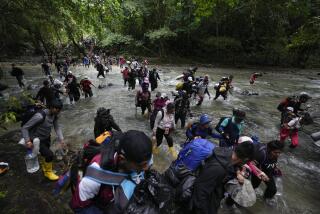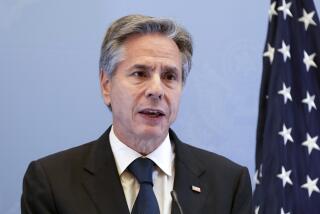Tight Security to Mark Airlift of 7,400 Cubans
- Share via
WASHINGTON — The Pentagon outlined elaborate plans Monday for airlifting more than 7,400 Cuban refugees now being interned at U.S. military bases in Panama to the Guantanamo Bay naval station in Cuba--with the hope that riots, fire-bombings and escapes can be averted on the way.
The detailed operation, which will begin Wednesday and is expected to stretch over three weeks, will involve more than a dozen planeloads of Cuban refugees and is expected to be one of the most closely guarded such ventures in recent memory.
Many of the Cubans are angry over having been denied entry into the United States after being picked up in the Florida Straits last summer. Although defections by sea once had meant guaranteed entry, President Clinton changed the policy to prevent a flood of new refugees.
The Cubans’ frustration over the Clinton Administration’s refusal to allow them into the United States led to rioting Dec. 7 at three of the four camps where they are being held. Some 1,500 Cubans were involved and more than 200 U.S. soldiers were injured.
To avoid any danger that the Cubans might attempt a hijacking, the U.S. troops who will guard the flights are being armed with everything from stun-guns to pepper spray and other devices that can be used to quell disturbances without endangering a plane.
The operation is being mounted to meet a deadline set by Panama for the Cubans to be out of that country by March 6. The migrants were sent to Panama after U.S.-run internment camps at Guantanamo became filled with Haitians and Cubans.
The Haitians since have been returned to Port-au-Prince following the return to power of President Jean-Bertrand Aristide. Of some 32,000 Cubans that U.S. vessels seized last year, 466 have been repatriated to Cuba and 72 have been sent to Spain.
About 2,300 other Cubans--either part of families with children or elderly persons who require medical care--have been allowed into the United States under a humanitarian parole program.
More to Read
Sign up for Essential California
The most important California stories and recommendations in your inbox every morning.
You may occasionally receive promotional content from the Los Angeles Times.










